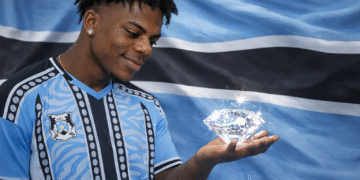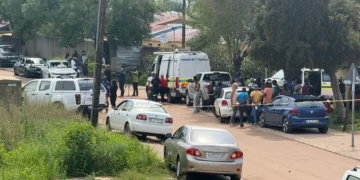From Outrage to Action: The Open Chats Call-Out
On 6 August 2025, a short clip from the Open Chats podcast went viral on X, TikTok, and WhatsApp. In the segment, the hosts—Mthokozisi Methula and Sinothando Kama—made derogatory, stereotype-laden remarks about Coloured people, including false claims about incest and mental instability. The clip drew immediate public condemnation.
That evening, Minister of Sport, Arts and Culture Gayton McKenzie, also the leader of the Patriotic Alliance (PA), publicly called out the podcast, pledging legal action. He posted clips online stating:
“I want a report today… Tonight, at 7pm, I will tell our people what action we are going to take.”
By 7 August, the PA had filed a criminal complaint against the podcast hosts at Brooklyn Police Station in Pretoria and signaled plans to approach the Equality Court and the South African Human Rights Commission (SAHRC).
Meanwhile, platforms and broadcasters reacted quickly. MultiChoice/DStv confirmed that its contract with Open Chats had ended on 25 July and that the controversial episode never aired on its platform. Initially, McKenzie implied that the SABC was involved in broadcasting the podcast, but after the SABC clarified it had no relationship with the show, McKenzie publicly apologized and dropped them from the complaint.
The Open Chats team also issued a public apology and removed the clip. Civil society groups, however, rejected the apology as insufficient. On 8 August, the SAHRC announced a formal investigation “on its own accord,” citing that free expression is limited by prohibitions on hate speech.
The Fallout: A Mirror Turns on McKenzie
Just as McKenzie’s actions against the podcast were gaining traction, journalists and social media users began digging into his past online activity. Within hours, several of his old tweets resurfaced, revealing racially insensitive and overtly racist remarks.
The tweets, which spanned several years, contained language and stereotypes targeting Black, Coloured, and Indian communities. Many were posted in contexts of political debate or personal commentary but were widely perceived as inconsistent with the moral authority McKenzie projected when condemning the podcast.
This quickly became a major media story, shifting public attention from Open Chats to McKenzie himself. Headlines highlighted the apparent hypocrisy: the same minister who called out racial stereotyping in a podcast had a history of tweeting racially charged content. Social media erupted, with memes, critical threads, and commentary framing the situation as a backlash against performative outrage.
By 9–10 August, national outlets were reporting extensively on both the podcast controversy and McKenzie’s old tweets, often connecting the two narratives in coverage under lines like:
“Minister McKenzie calls out racial stereotypes, but old tweets suggest a complicated history.”
Connecting the Two Stories: Lessons and Implications
1. Political and Reputational Risk
The combination of McKenzie’s public call-out and the resurfacing of his tweets illustrates the risk of public moral positioning. Leaders can mobilize outrage effectively, but any historical inconsistencies—especially on sensitive issues like race—can quickly undermine credibility. For McKenzie, the timing amplified the story, making it not just about the podcast but about trust and authenticity in political leadership.
2. Media Amplification and Digital Memory
The episode also demonstrates how digital archives and social media history can reshape narratives. While Open Chats was a target of legal and social scrutiny, the discovery of McKenzie’s tweets shows how past online content can resurface rapidly, especially in moments of viral attention.
3. Regulatory and Legal Dimensions
The SAHRC investigation and potential Equality Court filings are still ongoing, but now the debate also includes questions about online speech, accountability, and double standards. McKenzie’s own history complicates the moral framing of the legal actions, potentially affecting public perception and even the political viability of pursuing the case in court.
4. Future Implications for Creators and Public Figures
For content creators, the sequence highlights the interconnected risk ecosystem: viral content → public outcry → legal/regulatory action. For public figures like McKenzie, it also underscores the permanent record of digital statements: any attempt to hold others accountable may invite scrutiny of one’s own past words.
Timeline of Key Events
| Date | Event |
|---|---|
| 6 Aug 2025 | Open Chats clip goes viral; McKenzie publicly calls out the podcast. |
| 7 Aug 2025 | PA files criminal complaint; MultiChoice/DStv confirms contract ended July 25; McKenzie retracts claims about SABC. |
| 8 Aug 2025 | SAHRC opens formal investigation; Open Chats issues public apology. |
| 8–9 Aug 2025 | McKenzie’s old racist tweets surface; media coverage shifts to include his history. |
| 9–10 Aug 2025 | National debate ensues on hypocrisy, accountability, and digital record; civil society weighs in. |
What to Watch Next
- SAHRC Investigation – Could set precedents on online speech and hate speech thresholds.
- Criminal and Civil Cases – Equality Court filings and PA complaints could clarify responsibilities for podcasts and hosts.
- Political Repercussions – McKenzie’s credibility and the PA’s image may be affected, especially ahead of elections.
- Industry Guidelines – Platforms may implement stricter vetting, rapid removal, and content sensitivity training.
- Public Awareness – The incident is a cautionary tale about digital footprints and public accountability.
Sources
1. IOL — McKenzie takes legal action
2. CapeTownEtc — DStv drops Open Chats; PA lays charges
3. TimesLIVE — DStv/MultiChoice statement
4. Eyewitness News — McKenzie apologises to SABC
5. TimesLIVE — SAHRC opens investigation
6. News24/City Press — Political fallout & old tweets
7. Mail & Guardian Thought Leader — broader context & implications























